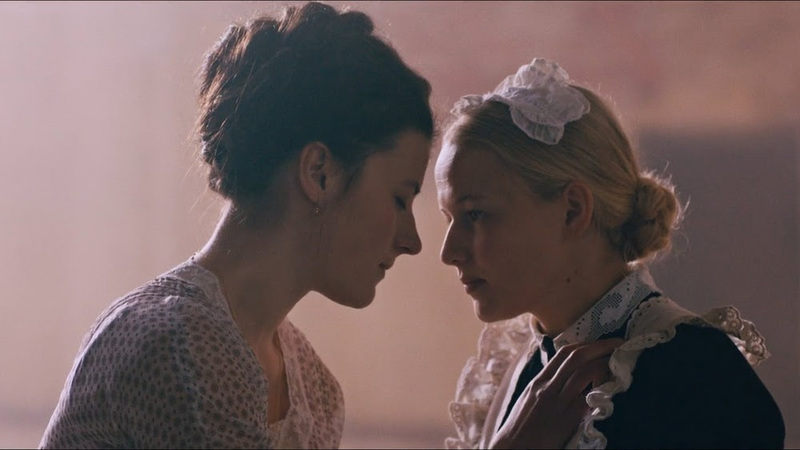
Power, Pain, and the Price of Silence
Chambermaid (Slúžka)
MOVIE REVIEW
Chambermaid (Slúžka)
-
Genre: Drama, History, Romance
Year Released: 2022, 2025
Runtime: 1h 50m
Director(s): Mariana Cengel-Solcanská
Writer(s): Mariana Cengel-Solcanská, Hana Lasicová
Cast: Dana Droppová, Radka Caldová, Vica Kerekes, Zuzana Mauréry, Cyril Dobrý
Language: Czech, Slovak, German, Hungarian, with English subtitles
Where to Watch: premiering via VOD& leading digital outlets on May 23, 2025
RAVING REVIEW: There’s a raw, persistent ache running through this story, the kind that doesn’t come from heartbreak or death but from the quiet stripping away of someone’s ability to choose their life. CHAMBERMAID locks its gaze onto that very loss, capturing a world where decisions are made in rooms women aren’t allowed to enter, and the only thing you’re permitted to own is your silence. Set in the fading shadow of an empire on the brink of collapse, this slow-burning drama uses its intimate scale to outline something haunting. The film’s commitment to portraying survival—messy, undignified, and deeply human—keeps it worth watching.
Anka isn’t introduced with sweeping narration to guide her arrival. She’s a teenager sent away from her family, pushed out of her home, and into a new one that doesn’t see her as anything more than labor. But that’s the point. There’s no romantic framing here, no false promise of opportunity. CHAMBERMAID doesn’t sell her journey as heroic—it shows her adapting, figuring out how to disappear when necessary, and staying visible only when it’s safe.
The story is tense in Anka’s relationship with Resi, the house's daughter. At first, it feels more like a game of social cruelty than anything resembling intimacy. Their early exchanges are steeped in humiliation and control, with one particularly harsh scene involving a staged accusation that undercuts any early idea of mutual trust. And yet, the story pushes them into a connection that eventually turns emotional and deeply reliant. The problem is that this progression is missing a middle act. The shift from power imbalance to companionship is a leap rather than a natural arc.
What stands out is the film’s understanding of atmosphere. The estate becomes a sort of pressure cooker rendered gracefully by Ladislav Janošták’s cinematography. Instead of showcasing the wealth or beauty of the home, the visuals emphasize space as a tool of control. Long hallways, dim light, and heavy doors are designed to make the servants small. Even silence is weaponized. The contrast between grandeur and suffocation speaks louder than any monologue.
Language, too, serves a thematic purpose. Characters slip between Czech, Slovak, German, Hungarian, and French depending on who they speak to or how they try to assert power. This creates a layered texture where meaning shifts depending on context and who is allowed to understand. For the servants from across the empire, these switches aren’t just linguistic—they’re emotional. For Anka, being constantly surrounded by voices that don’t speak to her only reinforces how little she belongs anywhere.
While Anka remains the film’s anchor, CHAMBERMAID gives weight to the women around her. Líza, who sees proximity to male power as her ticket out, and Kristina, who knows the back-alley skills needed to navigate reproductive choices and domestic tragedies, feel lived-in and real. These aren’t characters dropped in for thematic diversity—they’re necessary to the environment, shaping Anka’s sense of what it means to survive. Their presence gives the story depth, even when the main plot drifts.
Off-screen, the story of the film’s production speaks volumes. Reportedly met with hesitation by institutions uncomfortable with a female-driven tale that doesn’t flatter male characters or portray relationships in comforting ways, the film’s struggle to exist only reinforces why it should. It refuses to offer easy answers, even when occasionally stumbles in its delivery.
What lingers isn’t any plot twist or grand climax. The resilience in the details—the way Anka carries herself, the way the servants glance at each other across rooms, and the small daily rituals—means survival more than any revolution could. These moments stick, not because they change the world but because they happen despite it.
CHAMBERMAID doesn’t pretend to offer redemption or resolution. Its final images aren’t there to reward patience but to remind us that endurance can be an act of resistance. For a story rooted in systems that erase women, it’s telling that the film’s most powerful statement is simply that they were here.
Please visit https://linktr.ee/overlyhonestr for more reviews.
You can follow me on Letterboxd, Instagram, Twitter, and YouTube. My social media accounts can also be found on most platforms by searching for 'Overly Honest Reviews'.
I’m always happy to hear from my readers; please don't hesitate to say hello or send me any questions about movies.
[photo courtesy of MNIBUS ENTERTAINMENT]
DISCLAIMER:
At Overly Honest Movie Reviews, we value honesty and transparency. Occasionally, we receive complimentary items for review, including DVDs, Blu-rays, CDs, Vinyl Records, Books, and more. We assure you that these arrangements do not influence our reviews, as we are committed to providing unbiased and sincere evaluations. We aim to help you make informed entertainment choices regardless of our relationship with distributors or producers.
Amazon Affiliate Links:
Additionally, this site contains Amazon affiliate links. If you purchase through these links, we may receive a commission. This affiliate arrangement does not affect our commitment to honest reviews and helps support our site. We appreciate your trust and support in navigating these links.